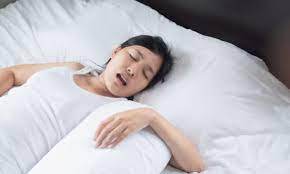- 13 October 2023
- 355
Silent Slumber: How to Tackle Saliva Leakage During Your Sleep

Introduction:
Greetings, fellow sleep enthusiasts! I am David Wolfe, a sleep aficionado, and in this article, we delve into a topic that many might find embarrassing but is surprisingly common—saliva leakage during sleep. Sleep is a critical aspect of our lives, and quality rest is paramount for our overall well-being. Unfortunately, for some, this peaceful slumber is disrupted by an issue as simple yet inconvenient as saliva leakage. Fear not, for we’re about to explore some effective strategies to tackle this concern and enjoy uninterrupted, refreshing sleep.
Sleep is an essential component of our daily lives. It’s the time when our body rejuvenates, heals, and prepares for the challenges of a new day. However, for some, this seemingly simple act becomes complicated due to issues like saliva leakage during sleep. This concern, though not often discussed, is more common than you might think.
1. Understanding Saliva Leakage: The What and Why
Saliva leakage during sleep, also known as sialorrhea, is a condition where saliva escapes from the mouth involuntarily during rest. It can be attributed to various factors, including sleeping posture, excess saliva production, or issues related to muscle control.
The reasons behind saliva leakage are diverse. Firstly, during sleep, muscle tone decreases, including the muscles that keep the mouth closed. This muscle relaxation can lead to saliva escape. Additionally, certain medical conditions or medications might cause an excess production of saliva, making leakage more likely.

2. Lifestyle Adjustments: The First Line of Defense
Several lifestyle adjustments can help manage saliva leakage during sleep:
- Regular Exercise: Engaging in regular physical activity can improve muscle tone, including the muscles in the mouth and throat, potentially reducing saliva leakage.
- Proper Hydration: Ensure you’re adequately hydrated during the day but reduce fluid intake close to bedtime to lessen the chances of excessive saliva production during sleep.
- Avoid Certain Foods and Drinks: Spicy foods and caffeine can stimulate saliva production. Limiting these before bedtime might help.
3. Sleep Position Matters: Finding Your Sweet Spot
Interestingly, your sleeping position can influence saliva leakage. Optimal sleeping positions that might mitigate this issue include sleeping on your back or on your side. These positions reduce the chance of saliva pooling in your mouth, hence decreasing the likelihood of leakage.
4. The Role of Pillows: Elevate for Relief
Pillows can play a significant role in managing saliva leakage. Opt for a supportive, ergonomic pillow that elevates your head slightly. This elevation can aid in preventing saliva from accumulating in your mouth, reducing the possibility of leakage.
5. Breathing Techniques: The Subtle Art of Nighttime Breathing
Practicing specific breathing techniques before sleep can have a calming effect on your body, potentially aiding in a more peaceful slumber. These techniques can help maintain a natural airflow, reducing the chances of saliva leakage.
Visual Table: Ideal Sleeping Positions
| Sleeping Position | Effect on Saliva Leakage |
|---|---|
| Back Sleeping | Lowers the possibility |
| Side Sleeping | Moderate effect |
| Stomach Sleeping | May exacerbate the issue |
6. Hydration and Diet: The Balance Between Water and Saliva
Maintaining the right balance between hydration and diet is crucial. Staying well-hydrated throughout the day can reduce the production of excess saliva during the night. Additionally, a diet that doesn’t stimulate excessive saliva production can be beneficial.
7. A Holistic Approach: Mindfulness and Relaxation Techniques
Stress and anxiety can exacerbate saliva leakage. Engaging in mindfulness practices, meditation, or relaxation techniques can help reduce stress levels, promoting a more restful sleep and potentially reducing saliva leakage.
Conclusion:
A good night’s sleep is essential for our overall health and happiness. While dealing with saliva leakage during sleep might seem bothersome, it’s a challenge that can be managed effectively. By understanding the causes and implementing practical lifestyle changes, you can significantly reduce the impact of this issue and enjoy a peaceful slumber.
Join me on this journey to conquer saliva leakage during sleep. Let’s ensure that your nights are undisturbed, allowing you to wake up refreshed and ready to embrace each new day.

